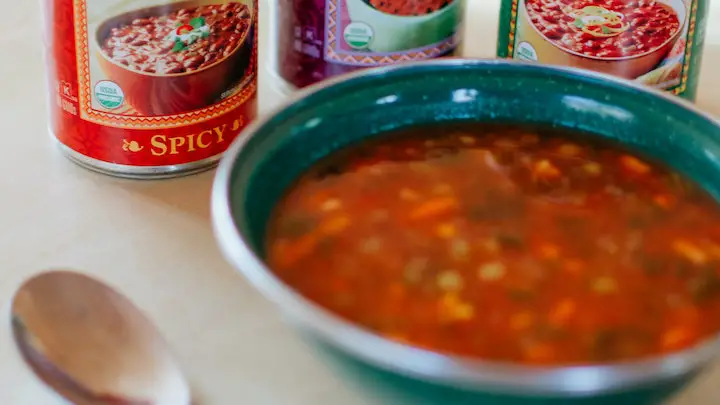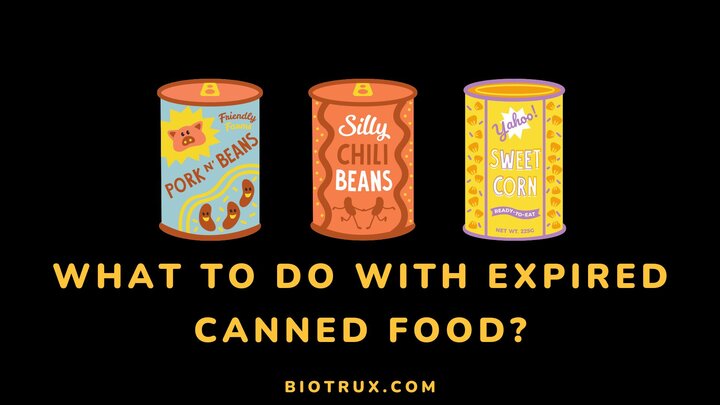Canned foods generally have “best by” or “best before” dates to indicate their day of expiration. While the content of expired canned food may not be fresh, this does not mean they are not edible.
In fact, most canned foods last years after their “best by” date if properly stored. Throwing such content away without proper inspection is not always the right thing to do.
This guide will expose you to the various (safe) ways you can get the best out of expired canned foods if you do not wish to eat them. Throwing them away will also only serve as a last resort in this guide (with reasons).
5 Things You Can Do With Expired Canned Food

1. Convert to compost
For an expired canned food to be compost-worthy, its content has to be either vegetables or fruits. This is because they easily undergo synthesis (disintegration), will not contaminate the compost, or attract rodents like meat.
Major rules guiding this practice include:
- Rinsing the canned fruits or vegetables with water before using them as compost.
- Liquid from the can must not mix with the compost pile. This is because such liquid usually contains salt, sugar, and preservatives capable of ruining the compost.
- Always confirm if the content in the can is compatible with the compost. If the compost breaks down the vegetable or fruit, it means they are compatible.
2. Feed them to your livestock or pet
If you prefer not to eat expired canned food, you can feed them to your livestock or pet. This is always a good option if the food has only expired for a few months or does not taste bad.
However, if the content of a canned food tastes bad, do not give them to your livestock or pet. Food category also matters when choosing this option.
For livestock (largely herbivores), fruits, vegetables, and other classes of foods with easy digestion. Pets, however, can take on anything from vegetables, and fruits to meats.
3. Recycle canned food
Instead of throwing away these products, you can carefully flush the food, rinse, and recycle the container (can). To do this, it is best to ensure the food in the container is free of bacteria.
Washing cans with extreme bacteria infestation can be messy and dangerous because of the amount of concentration they require. Also, if any of these cans appear bloated, it is best to throw them away.
4. Keep as a decoy
If you are a student of prep school, a big-time foodie, or a small business owner, there is a huge chance you have a large stash of food in your lodge or store. This indefinitely means some canned food will be closer to expiry than others.
Such food can be used as a decoy when emergencies or lack of food begin to set it among students. Your friends or hallmates who are aware of your food arsenal will come knocking and you can easily choose the ideal food to give them (based on close-to-expiry).
There is also a case for looters or those who prefer to come for your food without your knowledge. By strategically placing close-to-expiry canned food in highly noticeable places like your kitchen, you make the decision easier for them.
Looters will consider this as an easy pick not knowing they cannot store their loot for a very long time.
5. Throw it away (the last resort)
This is a very common solution for those who do not have livestock, or pets or have more than enough recycled cans. While throwing away expired canned food is not a bad option, most people do it the wrong way.
When throwing away such food, it must be placed in large garbage before being thrown into the trash. This is important because some expired canned food gets under a lot of movement pressure or is exposed to a fairly high temperature.
However, before you throw such food away, you must:
1. Inspect the can
This is to check for damages or rust that can contaminate the food. Cans with food content such as olives, pickles, fruits, or relishes must retain the quality of their oil, brine, or syrup.
However, if they appear opaque, muddy, or if the liquid level shows significant reduction, there is a problem and such food must be disposed of properly. If the container also has a bulge or leaks, please throw such food away.
2. Check for hissing sound/liquid spurt or color
Another way to confirm an expired product is bad for consumption is the hissing sound or liquid spurts that occur while opening them.
Minor color changes are only natural. However, if there is a significant color change or you see mold, throw it in the trash.
3. Smell the food
If all events turn out positive after opening and inspecting the can, the next thing to do is to smell the food. Take a good sniff of the food and judge its condition.
If it smells rotten or very strange, it means it is not safe for consumption and must be carefully disposed of. This entire process is also known as the olfactory test.
4. Taste it
A positive result up to this moment means there is a high chance the food is still ideal for consumption and you can taste it. Some may taste slightly different, especially ones with sweeteners.
However, if it gives off a foul taste, ensure you throw it in the trash.
FAQs
What happens if you eat expired canned food?
Most times, nothing will happen when you eat expired canned food.
This is why you must check the condition of the container and its content before eating such food.
What food never expires?
Food that never expires includes honey, salt, dried beans, rice, white vinegar, and instant coffee.
What is the longest shelf life of canned food?
According to the USDA (The U.S. Department of Agriculture), canned food with high acid content (such as tomatoes and citrus fruit) should stay fresh for 12 to 18 months.
Other canned food can last for about 2 to 5 years depending on how well you store them.
Conclusion
As you can see, there are more than one ways to get the best out of expired canned food. For the record, these foods are usually edible after months of expiry, however, they may not taste fresh.
You should only throw expired foods in the trash if they appear very strange (probably with mold), smell bad, contain excess bacteria or there is a hole in the can. When opting for this, ensure you do it appropriately.
I hope you found this guide helpful. Perhaps you would like to learn food preservation tips, these are the ways you can keep your food fresh.
Thanks for reading.

